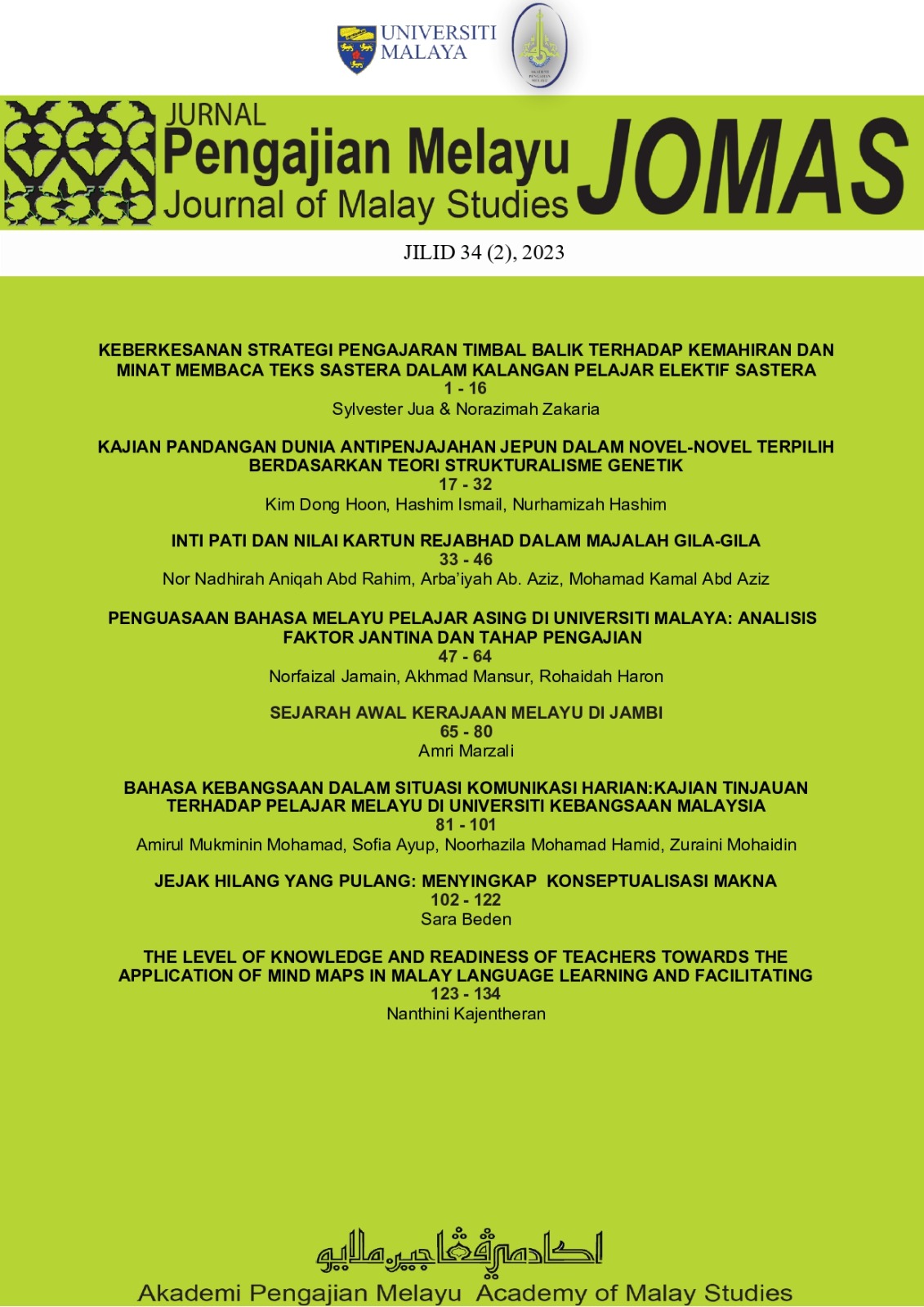SEJARAH AWAL KERAJAAN MELAYU DI JAMBI THE EARLY HISTORY OF THE MALAY KINGDOM IN JAMBI
Main Article Content
Abstract
ABSTRAK
Kajian berkaitan sejarah awal bagi sesebuah kerajaan sukar kurang dijalankan kerana kekurangan sumber dan bukti. Objektif kajian ini ialah mengkaji asal-usul dan lokasi awal kerajaan Melayu. Untuk mencapai objektif kajian, pengkaji menggunakan dua pendekatan, iaitu etnohistori (ethnohistory) dan perbandingan terkawal (controlled comparison). Etnohistori merupakan kajian tentang orang asli (native) dari sudut kombinasi pendekatan historis dengan antropologi, dengan menggunakan pelbagai sumber seperti sastera lisan, manuskrip, etnolinguistik, prasasti atau inskripsi laporan perjalanan, catatan Kerajaan asing, kultur material, peta, ekologi dan laporan kajian etnografi. Perbandingan terkawal pula ialah membandingkan sejarah dua atau tiga institusi sosial untuk mendapatkan ciri-ciri am daripada institusi-institusi berkenaan. Salah satu sumber awal yang digunakan dalam Makalah ini ialah perenggan Kisah Bermula di Bukit Si Guntang dalam manuskrip klasik Sulalatus Salatin (Sejarah Melayu). Isi daripada naskhah ini dibandingkan dengan isi daripada salah satu inskripsi Yupa yang dijumpai di Kalimantan Timur. Penggunaan laporan etnografi dapat menjelaskan konsep sosiopolitik, iaitu proses indianisasi. Proses indianisasi merupakan satu proses sosiopolitik yang telah berlaku di lokasi kelahiran Kerajaan Melayu dan Kutai Mulawarman yang bermula dengan kedatangan musafir bangsawan dari India Selatan, perkahwinan ketua musafir India dengan anak perempuan pemimpin tempatan. Dapatan kajian ini menyimpulkan bahawa kemunculan kerajaan Melayu di Jambi dan kerajaan Kutai Mulawarman di Kalimantan Timur diperoleh apabila perbandingan antara kedua sumber ini dilakukan. Implikasi kajian ini ialah asal-usul dan lokasi awal kerajaan Melayu tidak tetap di sebuah lokasi sahaja tetapi berpindah ke beberapa lokasi atas pelbagai faktor.
Kata Kunci: Sulalatus Salatin; Inskripsi Yupa; Demang Lebar Daun; Sang Kundungga; proses indianisasi
ABSTRACT
The initial purpose of this study is to find the origins and the first location of the Malay Kingdom. Such a study usually comes to a dead end due to lack of sources and evidence that can be used. To achieve this purpose, I will use two approaches: ethnohistory and controlled comparison. Ethnohistory is the study of native culture based on the combination of anthropological and historical approaches, with the use of various resources, such as oral tradition, manuscripts, ethnolinguistics, inscriptions, foreign reports, material culture, ecology, and ethnography. Controlled comparison compares the history of two or three local social institutions that can be generalized. One of the first sources used in this article is the paragraph “Kisah Bermula di Bukit Si Guntang” in the classic manuscript of Sulalatus Salatin (Malay History). The information given by this story can be compared to the information printed in one of the yupa inscriptions in East Kalimantan. Comparing these resources allows us to recognize the birth of the Malay Kingdom and the Mulawarman Kingdom. On the other hand, the use of ethnography helped to uncover the socio-political concept that can explain the birth of the two local kingdoms. The concept is called indianization by Coedès. The process of indianization means a socio-political process that happened at the location of the birth of the Malay Kingdom and the Mulawarman Kingdom. Firth is the coming of royal travellers from South India, continued by the marriage of the leader of the travellers with the daughter of the local leader, and finally emerged the Malay Kingdom in Jambi and the Mulawarman Kingdom in East Kalimantan. Lastly, the study of searching the origins and the location of the first Malay Kingdom has led me to believe that the Malay Kingdom did not remain in one location, but had moved to some other locations pushed by different factors. This thesis will be described in the last part of this article.
Keywords: Sulalatus Salatin; Inscription Yupa; Demang Lebar Daun; Sang Kundungga; Indianization process

